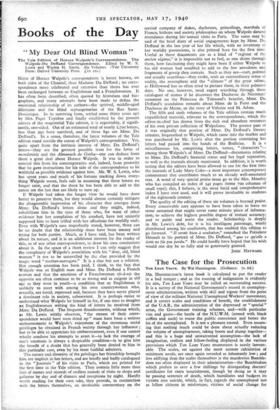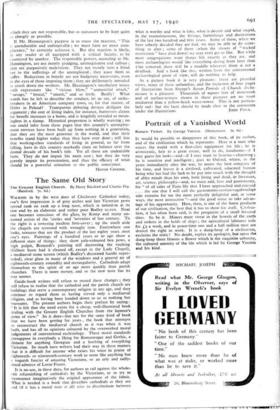The Case for the Prosecution
Ten Lean Years. By Wal Hannington. (Gollancz. 7s. 6d.)
MR. HANNINGTON'S latest book is calculated to put the reader in a bad temper ; and as the rousing of indignation is evidently his aim, Ten Lean Years may be called an outstanding success. It is a survey of the National Government's record in unemploy- ment administration, written with skill and vigour from the point of view of the militant National Unemployed Workers' movement; and it covers scales and conditions of benefit, the establishment of the the administration of the depressed or " special " areas, the Government training schemes, and—with particular vim and gusto—the battle of the N.U.W.M. (armed with black coffins and such) to rouse, the public conscience and better the lot of the unemployed. It is not a pleasant record. Even assum- ing that nothing much could be done about actually reducing the volume of unemployment, taking boom and slump together— and this is a huge and unwarranted assumption—the lack of imagination, realism and fellow-feeling displayed in the various provisions which Ten Lean Years enumerates is surely lament- able. The scales, set against the most austere calculation of minimum needs, are once again revealed as inhumanly low ; and less edifying than the scales themselves is the murderous Bumble- dom too often displayed in their administration—the Bumbledom which prefers to save a few shillings by disregarding doctors' certificates for extra nourishment, though by doing so it may be passing sentence of death, which humiliates and badgers its victims into suicide, which, in fact, regards the unemployed not as fellow citizens in misfortune, victims of social change for
which they are not responsible, but as nuisances to be kept quiet as cheaply as possible.
If Mr. Hannington's purpose is to rouse the reaction, "This is unendurable and unforgivable ; we must have no mole com- placency," he certainly achieves it. But this reaction is likely, in any reader at all equipped with a critical faculty, to be countered by another.- The responsible powers, according to Mr. Hannington, are not merely grudging, unimaginative and callous ; they are purposively malevolent. They not merely turn a blind eye to the sufferings of the unemployed ; they want them to 5uffer. Reductions in benefit are not budgetary necessities, even in the eyes of those imposing them ; they are deliberately intended to crush down the workers. Mr. Hannington's vocabulary teems with expressions like "vicious blow," "unmerciful attack," "savage," "brutal," "smash," and so forth. Really! What words has he left to describe the conduct, let us say, of strike- breakers in an American company town, or, for that matter, of Hitler in Poland? Transparent debating devices disfigure the argument ; the cost of living index, for instance, buttresses claims for benefit increases in a boom, and is lengthily revealed as mean- ingless in a slump. Historical proportion is wholly wanting ; no one could infer from these pages that this country's unemploy- ment services have been built ,up from nothing in a generation, that they are the most generous in the world, and that their benefits stand higher today than they have ever done ; still less that working-class standards of living in general, so far from falling, have in this country markedly risen on balance over the
dismal decade of his book's title. Yet all these are undeniable facts. They do not impair his main case ; but they do very gravely impair its presentation, and thus the efficacy of what should be a powerful stimulant to the public conscience.
HONOR CROOME.



































 Previous page
Previous page